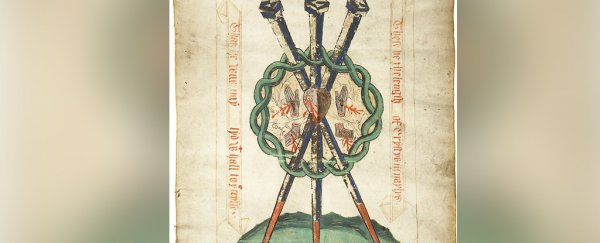An exquisite Christian prayer roll from five centuries ago has been rediscovered by researchers, giving the public its first glimpse at this little-seen religious medieval document, of a kind that rarely survives to the modern day in one piece.
The prayer roll, an example of an illuminated manuscript – in reference to the rich decorations that accompany its text – is a relic from the final years of Catholic doctrine in England, not too long before the Reformation transformed church life across Europe.
"Known hitherto only from its brief appearance on the market in the 1960s and 1970s, the roll has never before been closely examined or published in its entirety," explains art historian Gail Turner, the author of a new research article describing the rare find.
 (Gail Turner/Journal of the British Archaeological Association
(Gail Turner/Journal of the British Archaeological Association
Above: Depiction of Christ on the Bromholm Prayer Roll.
While the prayer roll has resurfaced in recent decades – before swiftly disappearing into the obscurity of private collections – the deeper mystery is how this 500-year-old roll made it to the present day at all, since these items, which are physically rolled out in order to be read, are prone to wear and damage in use, especially over a time scale of centuries.
For that reason, not many such prayer rolls of this kind are known to researchers, and the newly analyzed roll does show signs of abrasion, suggesting the document was regularly unfurled, and likely often kissed as well by worshippers, representing a devotional act "to experience Christ's Passion more directly and powerfully", Turner writes.
The prayer roll, dated to between 1505 and 1535, is linked to Bromholm Priory in Norfolk, an abbey founded in the early 12th century.
 The ruins of Bromholm Priory. (Bill Tyne/Flickr/CC BY-SA 2.0)
The ruins of Bromholm Priory. (Bill Tyne/Flickr/CC BY-SA 2.0)
"Only a few ruins of the priory remain today, but Bromholm was once a well-known medieval pilgrimage site," Turner explains, as it was once believed to hold a miraculous fragment of the True Cross upon which Jesus Christ was crucified.
The sacred fragment itself, contained in Bromholm's crucifix – known as the Rood of Bromholm – has long since been lost to history.
But the newly resurfaced prayer roll, which is thought to have been painted in Bromholm, depicts Christ on the Rood, among a number of detailed religious illustrations that help to fill out our historical appreciation of the the 'cult of the Cross' – the cultural artifacts and rituals of this chapter of Christian religion.
 The Bromholm Prayer Roll. (Gail Turner/Journal of the British Archaeological Association)
The Bromholm Prayer Roll. (Gail Turner/Journal of the British Archaeological Association)
"The roll reflects a time when the laity [lay people] had a real belief in both visible and invisible enemies, and when incantations were adapted to suit lay needs," Turner writes.
"Towards the end of the 15th century and the beginning of the 16th century there was a 'large undergrowth of semi-Christian charms which drew heavily on ecclesiastical formulae'."
To help devout worshippers out, a prayer roll gave well-to-do churchgoers a personal copy of prayers and religious iconography, which could be easily rolled out to read and appreciate when the mood struck.
They were easier and cheaper to produce than bound books, but because they did not have covers like books, prayer rolls are much less likely to emerge unscathed from the ravages of history.
For that reason, this incredibly well preserved prayer roll is almost a miraculous discovery all of its own – especially for its historical proximity to the lore of the True Cross.
"The survival of such a magnificent roll for over 500 years is therefore remarkable," Turner writes.
The document is described in the Journal of the British Archaeological Association.
